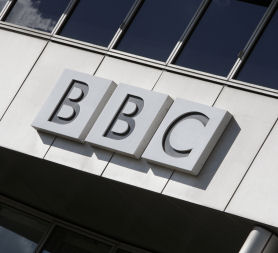Presenters warn BBC strikers against conference blackout
Ed Miliband and BBC presenters warn staff over a strike during the Conservative conference, as media pundit Steve Hewlett tells Channel 4 News the walkout would damage the broadcaster’s reputation.

Jeremy Paxman, Huw Edwards, Nick Robinson and Emily Maitlis are among 36 top presenters and political journalists who wrote a letter to BBC staff warning them that the planned strikes would clash with coverage of the Conservative conference in Birmingham.
The letter sent to the National Union of Journalists (NUJ) warned that strikes would damage the BBC and while “looking unduly partisan, particularly when none of the other party conferences have been targeted”.
Newly elected Labour Party leader Ed Miliband has called on BBC staff not to black out David Cameron’s party conference speech next week in the “interests of impartiality and fairness”.
“Whatever the rights and wrongs of the dispute between Bectu [union] and the BBC, they should not be blacking out the prime minister’s speech.
“My speech was seen and heard on the BBC and in the interests of impartiality and fairness, so the prime minister’s should be.”
Unions are expected to meet with BBC management today for last minute talks aimed at calling off the corporation’s first strikes in five years. Staff voted for industrial action in a dispute over planned changes to the BBC pension scheme.
'An open goal to the BBC's enemies'
Media commentator and columnist Steve Hewlett told Channel 4 News that if the strike went ahead, the BBC reputation would suffer.
"A curious twist in this is arising. The BBC are being very hard on austerity and that is what the government says is necessary. In the coming months everyone is going to have to do what the BBC is doing.
"But BBC management have handled this in a catastrophic way: announcing pension plans that looked like final conclusions; failing to suggest a review of executive pension top-ups until week three.
"On the one hand the BBC is engaged with something that is necessary and that the government would support. On the other the BBC has mishandled it and staff are very angry.
"If there's a strike, they've asked for it.
"I don't think workers are being unreasonable, but the timing really is unfortunate. It leaves an open goal to the BBC's enemies. It's complicated and unintentional - but it's an open goal.
"It would be sensible to call it off."
The first 48-hour strike is due to begin on 5 October and would coincide with major events at the conference such as David Cameron’s keynote speech to party members. A second stoppage is planned for 19 October and would affect the BBC’s coverage of Chancellor George Osborne’s spending review announcement.
The letter continued: “Impartiality is the watchword for the BBC’s political coverage and we would not wish to give a misleading impression that this is no longer something we value highly.
“This is no comment on the proposed retrospective changes to the pension scheme which have cased widespread anger in the BBC, nor is there any disagreement with the principle of strike action.
“However, we are clear that the choice of strike dates is counterproductive.”
There is widespread support for the strikes from the NUJ and other unions, Bectu and Unite. The letter has promoted an angry response from union leaders.
Ian Pollock, chair of the NUJ’s BBC London branch, criticised non-members for “trying to unpick democratically taken decisions” after an unnamed source told the Daily Mail that presenters were uneasy about the strikes.
The NUJ said BBC members voted overwhelming in favour of strike action.
“The selection of specific dates was not a political act,” NUJ general secretary Jeremy Dear said.
“The dates were chosen because they are major broadcast events and for no other reason”.
The Corporation has offered to raise its contributions to staff pensions by more than £100m, to about £250m a year. Union leaders want assurances on the protection of pension benefits against inflation.
Yesterday BBC Director General Mark Thompson told staff he also thought the Tory conference was not the right moment to strike while asking them to “reflect” on the choice of dates. He also announced that he and other senior executives would give up their pension top-ups.